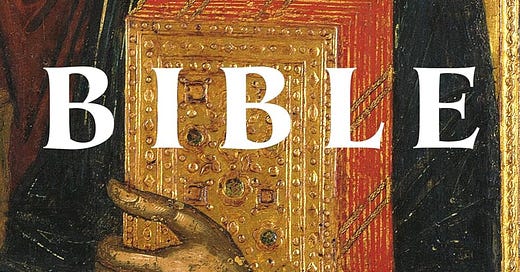Most books published do not have histories worth remembering, global or otherwise. That the Bible emphatically does is evidence of its unique worth.
So concludes Yale professor Bruce Gordon, as he reaches the end of his remarkable attempt at a global history of a book whose “words have comforted, inspired, sickened, and haunted humanity” everywhere on Earth. A book that is only becoming “more accessible, more available, more global” after thousands of years, a collection of disputed texts that “inspires striving but rejects possession and exclusivity” among its many diverse readers can never be the subject of a truly comprehensive history. But Gordon comes as close as any historian is likely to get.
So while I’m decently familiar with the history of the Bible, I’m happy to share some of what I learned from Gordon.
The Pre-Reformation Ubiquity of the Bible
We Protestants sometimes imagine that we are the true “people of the Book” within the Christian family.1 Yet “without a doubt,” writes a church historian best known for his biographies of the Protestant reformers Huldrych Zwingli and John Calvin,
one of the greatest mistruths perpetuated by the Protestant Reformation is that the Bible disappeared during the Middle Ages. True, few in the medieval world ever touched a Bible, and even fewer read it. Yet the Bible was everywhere: heard and seen in worship, performed on temporary stages erected in village squares, recounted in song, shown in pictures on church walls. It was in medicine, colloquial speech, and roadside chapels and crosses. The medieval Bible was not limited to a seldom-seen book; it was the book of life. It was internalized in word and image through repeated experiences.
That doesn’t mean that he doesn’t make much of the role of Martin Luther et al. in taking advantage of the printing press to make much more widely available more complete vernacular translations that had existed in part throughout the High and Later Middle Ages. And I was tickled to see Gordon return so often in mid-book to the role of 17th/18th century Pietists in not only encouraging biblical scholarship, translation, and publication, but in folding together ancient practices of reading and prayer, the Reformation commitment to sola scriptura, and emerging insights from science “into a spiritual world of encountering the Bible with sincere devotional intent.”
But what he concludes about medieval Christians could actually describe many Christians, from its origins in antiquity through its present-day growth in impoverished regions of the Global South: “In a mostly illiterate world, the Bible was simply known.”
Against False Dichotomies
Again and again, Gordon refuses to repeat false dichotomies about the place of the Bible within Christianity and its surrounding, changing culture. The Scientific Revolution didn’t so much discredit the Bible as convince the likes of Isaac Newton “that the study of the natural world and of history and languages only enriched the understanding of the Bible.” Even as the Enlightenment then gave rise to historical-critical methods of biblical interpretation, “it would be a mistake to see this period as one of rejection or repudiation of religion… The Bible retained center stage and, in most cases, was reconciled with what was being learned about science and history.”
Nor do the subjects of Gordon’s book mostly feel compelled to choose between sacramental worship and Bible reading. Scripture has been “the launching point for communal worship” since the earliest days of Christianity, as when the 2nd century apologist Justin Martyr recorded believers in Rome starting worship with readings from “the memoirs of the apostles or the writings of the prophets,” hearing an exhortation “to the imitation of these good things,” and then eating a meal of “bread and wine and water.”
Keep reading with a 7-day free trial
Subscribe to The Pietist Schoolman to keep reading this post and get 7 days of free access to the full post archives.




